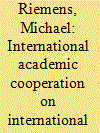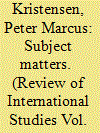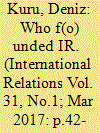| Srl | Item |
| 1 |
ID:
102444


|
|
|
|
|
| Publication |
2011.
|
| Summary/Abstract |
Based on considerable archival research in Switzerland and France, this article considers the creation of specialised institutions and centres for scientific research, discussion and information on international questions after the First World War. It analyses the origins and development of the International Studies Conference from 1928 until 1946, and it pays particular attention to the institutional setting provided by the ISC. With the help of an international questionnaire of the League of Nations from the early 1930s the article also discusses the university teaching of IR in the US, Great Britain and on the European continent in the interwar period, and it looks at some of the institutional settings, especially academic institutions (departments, chairs, schools and so on), that were available at the time.
|
|
|
|
|
|
|
|
|
|
|
|
|
|
|
|
| 2 |
ID:
192316


|
|
|
|
|
| Summary/Abstract |
This article contributes to the critical historical research that has demythologised the ‘noble origins’ of the International Relations discipline (IR) by exposing its imperial, colonial, and racist legacies. Where most critical historiographies have unveiled the centrality of racialised and imperialist ontologies in individual thinkers and theories, this article traces imperialist origins of international thought by reconstructing its impact on administrative-institutional infrastructures. Specifically, it interrogates the most systematic and institutionalised attempt to define the ‘subject matter’ of IR under the International Studies Conference (ISC) organised by the International Institute of Intellectual Cooperation (IIIC) of the League of Nations. Through a parallel reading of the archives from ISC's ‘administrative meetings’ and ‘study meetings’, the article contends that the seemingly academic discussions on the subject matter of IR in the ‘administrative meetings’ were in fact intertwined with the imperialist-colonial politics central to ‘study meetings’. The article thus not only challenges IR's conventional history, but its historical ontologies by revealing how race and empire were central to the constitution of its very subject matter and its early institutionalisation.
|
|
|
|
|
|
|
|
|
|
|
|
|
|
|
|
| 3 |
ID:
152335


|
|
|
|
|
| Summary/Abstract |
This article aims to present a history of International Relations (IR) that looks at the role of three big American foundations (Carnegie Endowment for International Peace, Rockefeller, and Ford foundations) in the development of IR as an academic field in continental Europe. Its framework goes beyond the usual disciplinary history narratives that focus on IR’s US or UK trajectories, pointing instead to American foundations’ interwar and early post–World War II influence on French and German IR. The cases emphasize US foundations’ interactions with European scholars and international scholarly organizations as major factors shaping IR’s developmental pathways. This study offers a way to consider foundations’ role in IR’s gradual academic institutionalization by connecting disciplinary historical approaches to disciplinary sociology. Its sociologically conscious position underlines the significance of American philanthropies in a historical narrative and recognizes the relevance of transnational dynamics by going beyond usual emphases on ideas and national contexts.
|
|
|
|
|
|
|
|
|
|
|
|
|
|
|
|